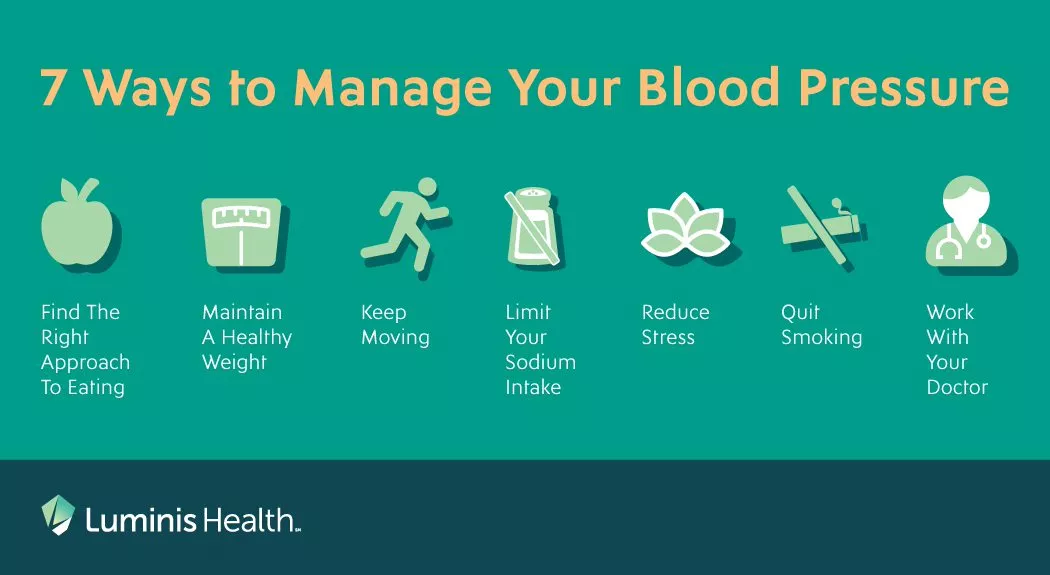Hospitals across Maryland, including Luminis Health, are seeing increased flu-related visits that may lead to longer emergency department wait times. We recommend wearing a mask at all Luminis Health locations, using Virtual Urgent Care for non-emergency needs, and going to the Emergency Department for severe or life-threatening symptoms while we continue to support our teams and care for our communities.

When it comes to knowing your risk for heart disease – the number one killer in the U.S. – understanding your blood pressure numbers is the best place to start. Numbers higher than 120/80 are a warning sign that hypertension may be at work damaging your blood vessels and making your heart work harder than it should.
In many cases, lifestyle changes can help bring your blood pressure under control and reduce your risk of heart attack and stroke. Even better, making these changes will also reduce your risk of developing other conditions and improve your overall health.
1. Stop smoking
Quitting smoking is the most powerful thing you can do on your own to lower blood pressure and improve your overall health since every cigarette you smoke causes a temporary increase in your blood pressure and heart rate. In fact, did you know that just 20 minutes after you smoke your last cigarette, your health starts improving?
Anyone who’s tried to quit knows it’s hard. But having the right support can help. At Luminis Health Anne Arundel Medical Center (LHAAMC), we’re here to help you quit smoking or using other tobacco products. You can contact the LHAAMC smoking cessation program (443-481-5366 or 443-481-5367) for more resources. 1-800-QUIT-NOW (1-800-784-8669) or SmokingStopsHere.com, also provides a free service by phone or online that offers counseling and free smoking cessation medications mailed to your home.
2. Find the right approach to eating
The National Institutes of Health (NIH) recommends the DASH (Dietary Approaches to Stop Hypertension) diet as the best way to control blood pressure. It’s a clean, whole food eating approach based on reducing certain types of foods and increasing others. The DASH diet recommends loading up on:
Foods high in potassium and magnesium, such as beans and leafy greens
Fruits and vegetables
Lean proteins
Low-fat, low-sugar dairy
Whole grains
It also recommends cutting back on:
Added sugars, often hiding with names ending in “ose” (fructose, sucrose, maltose, dextrose), or as syrup (corn syrup, rice syrup)
Alcohol
Processed and packaged foods such as deli meats and bacon, canned soup, frozen meals, chips, snacks and cookies
Saturated fats
3. Get to and maintain a healthy weight
Being overweight strains the heart and increases your risk for high blood pressure. Extra pounds can also cause sleep apnea, which can also play a role in elevating your blood pressure.
Weight loss is one of the most effective ways to lower your blood pressure: Losing even 10 pounds can make a difference, and reduce your risk for other health problems, too.
4. Keep moving
Regular exercise strengthens your heart, helping it pump with less effort and lowering your blood pressure. But don’t assume you have to run a marathon to earn the benefits of exercise. The American Heart Association recommends 150 minutes a week: That’s just 30 minutes of moderate physical activity, five times a week. Walking, cycling, jogging, dancing and swimming are all great examples of moderate physical activities that can get your heart pumping harder.
Strength training and flexibility exercises can lower blood pressure and improve your overall health, too. And don’t forget simple, everyday activities either, such as:
Completing household chores
Doing yard work
Parking at the far end of the parking lot
Taking the stairs, whenever possible
If you haven’t been exercising, ease into it and talk with your doctor if you have medical conditions that might limit the amount and type of exercise you do.
5. Limit your sodium intake
Sodium (salt) is one of the biggest offenders when it comes to raising blood pressure. While it doesn’t impact everyone, if you’re trying to lower your blood pressure without medication, reducing the amount of salt in your diet may help.
Like sugars, sodium can be surprisingly high in many foods — and processed, packaged and restaurant foods are well-known culprits. Read labels and focus on eating whole, less processed foods.
Classic examples of high sodium food would include chips, processed meats and almost all foods from Chinese, Italian, Mexican, Indian and fast food restaurants. Try to minimize your exposure to these as much as possible.
The American Heart Association recommends adults with hypertension limit sodium intake to 1500 mg or less a day.
6. Reduce stress
Researchers aren’t sure how stress affects blood pressure long term. But they do know that too often, people turn to unhealthy food, smoking or alcohol to deal with stress, which can contribute to high blood pressure.
Commit to finding a healthier way to cope with stress that works for you. Here are a few, stress-busting examples:
Listen to music
Meditate
Practice and express gratitude
Relax with an activity you enjoy
Try Yoga
7. Work with your doctor
If you find out you have or are at risk for developing high blood pressure, work with your doctor to develop a plan to manage it. Partnering with your doctor is key to getting and keeping blood pressure under control. Do your part by:
Educating yourself about high blood pressure
Learning how to monitor your blood pressure at home
Taking ownership of your treatment
Lifestyle changes are often enough to get and keep blood pressure under control. But some people need medication along with lifestyle changes. It’s important to take medication exactly as your doctor prescribes – no missed doses or days.

Waseem Hussain, MD, is a physician with Luminis Health Doctors Community Medical Center.

Jennifer Brady, MD, is a cardiologist with Anne Arundel Medical Group Cardiology Specialists.



